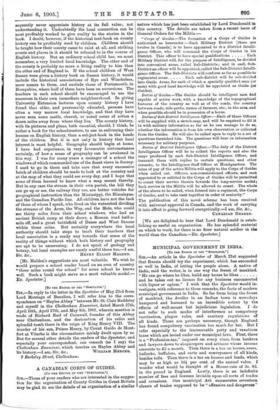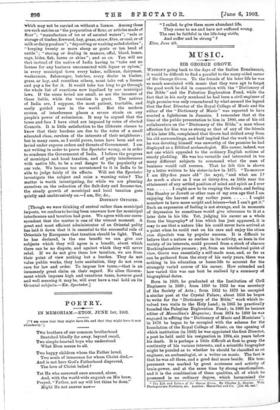MUNICIPAL GOVERNMENT IN INDIA.
[To TER EDITOR 011. THE "SPECTATOR"] SIR,—An article in the Spectator of March 21st suggested that Russia should try the experiment, which has succeeded so well in India, of letting the people alone. A native of
India, said the writer, is in one way the freest of mankind
" He can go where he likes, build any house he likes and he takes out no license for any business unconnected with liquor or opium." I wish that the Spectator would in- vestigate, with reference to these remarks, the facts of modern municipal government in India- So far from being the freest of mankind, the dweller in an Indian town is nowadays hampered and harassed to an incredible extent by the effects of well•meant but injudicious legislation. I do not refer to such modes of interference as compulsory vaccination, plague rules, and sanitary regulations of all kinds. These are perhaps necessary, though England has found compulsory vaccination too much for her. But I refer especially to the innumerable petty and vexatious taxes which are levied under our municipal laws. First, there is a " Profession-tax," imposed on every class, from bankers and lawyers down to shopkeepers and artisans whose income amounts to £2 a month. Then there is a tax on horses, asses, bullocks, buffaloes, and carts and conveyances of all kinds, besides tolls. Then there is a tax on houses and lands, which may be as high as 164 per cent. of the annual value. I wonder what would be thought of a House-rate of 3s. 8d. in the pound in England. Lastly, there is an indefinite number of fees and licenses leviable upon all sorts of trades and occasions. One municipal Act enumerates seventeen classes of trades supposed to be " offensive and dangerous "
Which may not be carried on without a license. Among these are such entries as "the preparation of flour, or articles made of flour"; "manufacture of ice or of aerated waters"; "sale or storage of timber, firewood, hay, grass, straw, fibre, or coal, or of milk or dairy produce" ; "depositing or washing soiled clothes"; " keeping twenty or more sheep or goats or ten bead of cattle "; "storing or dealing in manure, offal, blood, bones, rags, hides, fish, horns or skins " ; and so en. You will see that instead of the native of India having to "take out no license for any business unconnected with liquor or opium," in every municipal town every baker, milkman, dairyman, washerman, fishmonger, butcher, every dealer in timber, grass, or hay, and countless others, must take out a license and pay a fee for it. It would take too long to go through the whole list of exactions now legalised by our municipal laws. If the sums levied are small, so are the incomes of those liable, while the vexation is great. The natives of India are, I suppose, the most patient, tractable, and easily guided race in the world. But the modern system of interference places a severe strain on any people's power of submission. It may be argued that the taxes and fees I have cited are imposed by votes of elected Councils. It is little satisfaction to the illiterate classes to know that their burdens are due to the votes of a small educated class, careless of the interests of their neighbours ; but in many cases, as I could prove, taxes have been and are levied under express orders and threats of Government. I am not writing in order to prove the Spectator wrong, or in order to condemn the Government of India. I believe the progress of municipal and local taxation, and of petty interferences with native life, to be a real danger to the popularity of our rule. We become too accustomed to it in India to be able to judge fairly of its effects. Will not the Spectator investigate the subject and raise a warning voice ? The matter is worth investigating, for while we are pluming ourselves on the reduction of the Salt-duty and Income-tax, the steady growth of municipal and local taxation goes quietly and unobtrusively on.—I am, Sir, &c., DISTRICT OFFICER.
[Though we were thinking of central rather than municipal imposts, we confess to having been unaware how far municipal interference and taxation had gone. We agree with our corre- spondent that the matter is ono of the utmost moment. A great and most efficient administrator of an Oriental polity has laid it down that it is essential to the successful rule of Orientals by Europeans that taxation should be light. That, he has declared, is the one benefit we can give our subjects which they will agree is a benefit, about which there can be no dispute, and against which they will never rebel. If we do not give them low taxation, we are from their point of view nothing but a burden. They do not value public works, they hate sanitation, they do not even care for law and order. To impose low taxes,—that is an immensely great claim on their regard. No alien Govern- ment which imposes high and vexatious taxes, however good and well meaning it may be, will ever have a real hold on its Oriental subjects.—En. Spectator.]











































 Previous page
Previous page